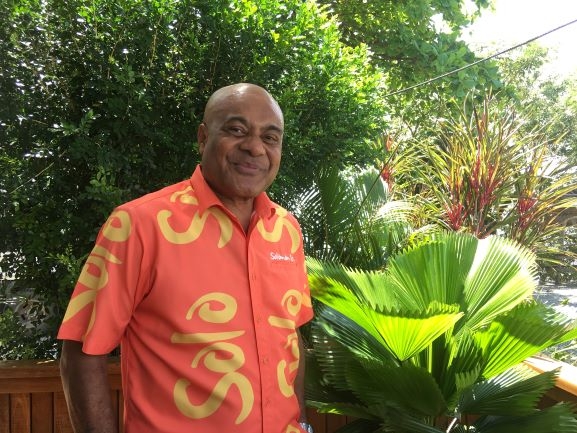Late last month, Solomon Islands Prime Minister Manasseh Sogavare praised Tourism Solomons for its “relentless effort” to consistently grow visitor arrivals.
PM Sogavare also expressed optimism about the opportunities the relationship with China will bring to the sector: “It is crucial that development and business opportunities with China in the tourism sector are strategically embraced,” he told industry leaders.
Josefa Tuamoto, who is originally from Fiji, is the CEO at Tourism Solomons. He says it’s a great place to work, and there is good scope for growth if some of the fundamentals are set right.
Islands Business: You’ve been with Tourism Solomons for a while now. What changes have you seen during your time in the role of CEO?
Josefa Tuamoto: I’ve seen a lot of changes, particularly infrastructure changes. I was here when they started with the port, they’ve finished the port with the Japanese. The roads now are much better than when I first came. I think the next phase is to continue that further.
From a tourism perspective, a lot of work Tourism Solomons has done is to basically tell the story to government. Why it [tourism] is important. When you see the economics of the country, logging is basically slowing down. So we’ve had to look at other opportunities and tourism presents one of those.
[In the Solomons] it’s not your normal four star, five star hotels [that dominate], it’s the small ones which I think is quite unique. From the tourism side we’ve also seen a lot of changes within the industry, a lot of people want to engage with us more try to understand a lot of things that we do, our role was also to escalate Tourism Solomons so they see the value. That was one of the big jobs. I think now we have proven that we are here for the long term, because the economy needs tourism.
There is still a long way to build human capital.
I don’t think we will ever reach that point where we will say we are happy. There is always room to improve. And also to move out to the provinces too. When we launched our brand one of the things we wanted to do was reach out to the provinces. We had a presentation to cabinet, they endorsed that.
The DNA for the destination is the culture. Here there are so many cultures, within a province there is so much and [it’s] so authentic. When I say authentic, I mean it.
The other things is wreck diving is quite huge, very, very strong.
Also the sense of adventure. This is a destination where you have to want to come. You can’t just rock in. I think you’ll be in awe of a lot of things, the culture, particularly if you go to the provinces, it’s so different.
IB: Where are you seeing growth?
Tuamoto: To a certain extent our growth is managed growth. It’s not just coming and building hotels. The country is aware of that- that you can’t just start building hotels and expect people to come. People have to come for a reason so that they can enjoy their time.
Our visitors from Australia, New Zealand and the US are coming up.
IB: Is there opportunity in the MICE (meeting, incentives, convention and events) market?
Tuamoto: The meeting and incentive market is mainly centred on Honiara because we don’t have the facilities outside – Mendana and Heritage Park are the two main places. We’ve been blessed because there are so many NGOs and development partners that come and hold their conferences here and it has helped us. Essentially because our business traffic is quite high, the leisure market is only about 30 percent and our goal is to change that to about 50 percent or even more. That will only happen if we have enough rooms at a reasonable rate.
Prices are a big issue. If you want to bring a family, there’s flights and accommodation. That will get into your pockets when you can go to Fiji or Samoa, Tonga or Vanuatu for half the price.
IB: Is there much packaging of holidays and experiences done?
Tuamoto: Very few [packages are created]. We only about seven wholesalers. We’d like to see more wholesale packaging but that will only be driven by the product. The product has to be right for them to sell.
I think in terms of activities they are ok. There are WW2 dives, those kinds of things. And also we have some niche wholesalers who come. They are focussed on certain products such as birdwatching. They don’t do anything else but birdwatching. We also have one wholesaler that specifically does fishing and surfing.
IB: What other niches are there?
Tuamoto: We are the niche. (laughs) Because our arrivals is 30,000 and that’s like a day in Fiji. Our core is dive, then we have birdwatching, fishing, trekking.
IB: What opportunities does the diplomatic switch to China present?
Tuamoto: The main issue here is inventory. We don’t have sufficient inventory. Hopefully with China coming in they might consider investing in tourism, that would be a big thing for us apart from just the sheer numbers in terms of marketing. That would open up a lot of things. We don’t have ADS which is full destination status as yet, so who knows, the government might decide to go with it, and it might open up a lot of avenues for us too.
In Fiji when I was there, we didn’t have it, so we worked with the ministry of tourism and civil aviation. Sometimes you actually don’t need it, but it is more politically right to seek it.
Related stories:
